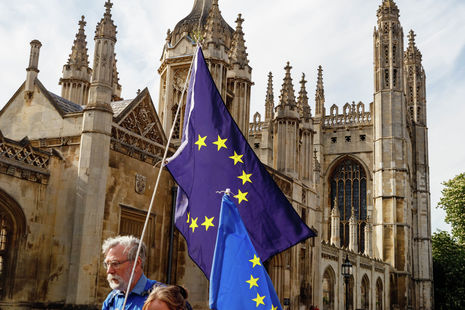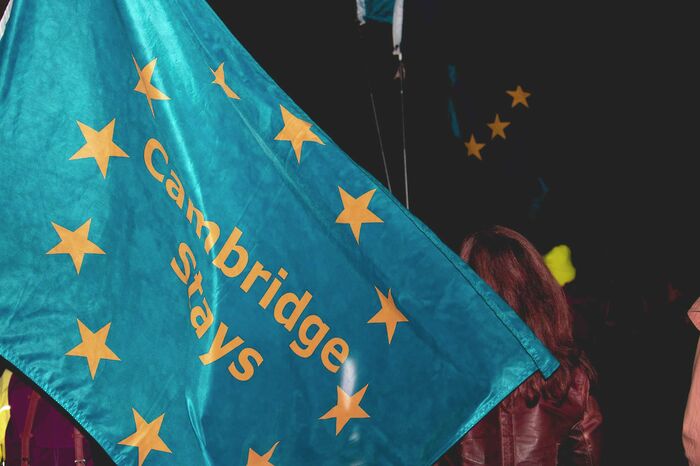GU President says settled status feels “un-British” as Brexit day arrives
The Government passed the Withdrawal Agreement Bill on the 9th January, and the European Parliament voted overwhelmingly in favour of its ratification on Wednesday

The UK is set to leave the European Union at 11pm tonight.
With the day of departure here, Graduate Union President Alessandro Ceccerelli, who has to prove he has been resident in the UK for five years to achieve settled status, said it felt “un-British”.
EU, EEA and Swiss citizens must apply to the government’s ‘Settlement Scheme’ by 30th June 2021 if they wish to continue living permanently in the UK after the deadline.
Depending on whether these citizens have lived in the UK for five years continuously, they will be eligible for either ‘pre-settled’ or ‘settled’ status. The latter are entitled to longer future residency stints abroad, and automatic British citizenship for their children.
“EU students and citizens have been entering the country legally, but more and more they feel like they have been treated with suspicion … I worry that, even with a slightly more liberal regime, European citizens such as myself will always have to prove something, even though we contribute our fair share,” Ceccerelli commented.
“I have just been made a promise by the British Government that they will let me stay in the UK, without being molested by requests to prove it from now on. I am not sure that I can trust that promise, nor do I think that I can control what will happen to me in the next [sic] years”.
The Government passed the Withdrawal Agreement Bill on the 9th January, and the European Parliament voted overwhelmingly in favour of its ratification on Wednesday.
CUSU President Edward Parker-Humphreys insisted he has been “working closely with the University” in the lead-up to Brexit.
“At meetings of the University’s EU Working Group, I have repeatedly highlighted the importance of keeping students up to date with key developments and have encouraged the University to send all-student email communications to ensure access to the necessary information in relation to Brexit”.
On an institutional level the UK’s departure from the EU puts at risk funding the University receives from projects like Horizon 2020, the biggest EU Research and Innovation programme, receiving nearly €80 billion of funding available over 7 years.
In 2017, the University’s Schools, which are groupings of related faculties and departments, received a total of £59,220,000 in research funding from the EU Commission. The EU is the University’s third largest source of such funding, representing 12.7% of Cambridge’s external research income, after UK charities (30.59%) and Research Councils (31.5%).
The European Universities Association, composed of universities from 48 countries, was optimistic regarding changes to academia and research post-Brexit, stating on Facebook “the way may be winding, but the direction is right”.
Questions still remain over the Government’s commitment to continued academic exchanges, seen by a refusal to commit to negotiating full membership of the Erasmus+ scheme.
Although the UK will leave the EU’s decision-making bodies, it will remain in the single market and customs union during the transition period which is expected to end on 31st December 2020. During this time the UK will participate in all EU programmes as usual.
Prime Minister Boris Johnson has described Brexit as a “fantastic moment” in the history of Britain.
Cambridge voted to remain by 73.8% during the 2016 referendum.
 News / Right-wing billionaire Peter Thiel gives ‘antichrist’ lecture in Cambridge6 February 2026
News / Right-wing billionaire Peter Thiel gives ‘antichrist’ lecture in Cambridge6 February 2026 News / John’s duped into £10m overspend6 February 2026
News / John’s duped into £10m overspend6 February 2026 News / Epstein contacted Cambridge academics about research funding6 February 2026
News / Epstein contacted Cambridge academics about research funding6 February 2026 News / Lucy Cav students go on rent strike over hot water issues6 February 2026
News / Lucy Cav students go on rent strike over hot water issues6 February 2026 News / Corpus FemSoc no longer named after man6 February 2026
News / Corpus FemSoc no longer named after man6 February 2026










